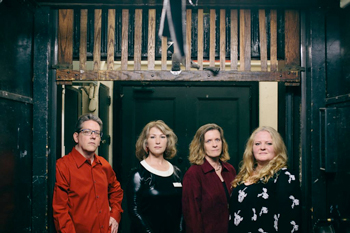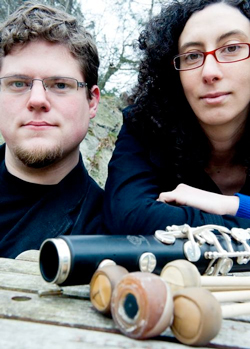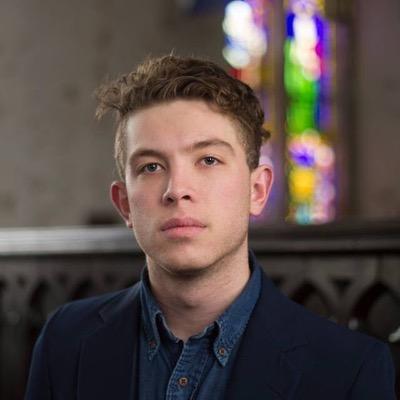by Timothy Robson

The St. Paul-based Zeitgeist –– clarinetist Pat O’Keefe, percussionists Heather Barringer and Patti Cudd, and pianist Nicola Melvill, pictured above — performed Cambodian-born composer Chinary Ung’s Play Spiral XIV “Nimitz” (2016), a work whose tonal structure and melody are influenced by traditional East Asian music. Piano and clarinet were center stage, with a percussionist on either one of them playing a vibraphone and various accessory instruments, the other covering a large marimba, drums, and cymbals.
The composer weaves a complex antiphonal texture, replete with improvisatory melodies spun out by the clarinets (E-flat, B-flat, and bass), and syllabic vocalizations from the percussionists and pianist. At the end, the combination of tuned percussion, piano, and whistling created a haunting effect.

Dan VanHassel’s Epidermis (2017) was a tour de force for the performers. Advocat handled the motoric rhythms, high-register “squeals,” multiphonics, and other extended techniques, while Sharrock played an unending stream of increasingly complex rhythmic patterns on all surfaces of the marimba. The electronics were more closely integrated into the texture than in the Volness, and at times the sounds resembled electronic dance music surrounded by white noise. Though the performers looked exhausted at the end, the audience was energized.

Although the slow third movement, titled “Plum Blossom,” was the shortest, it was the most interesting, with its mournful melody in violin and cello, and the viola playing in the plucked, melodically drooping style of the pipa (the Chinese lute). The sustained and serene music was heterophonic: musical lines were performed simultaneously among the instruments, but not in unison, creating an echoing texture.

plainsong (2014, rev. 2017) was, in the composer’s words, “early church music combined with Nina Simone,” and featured arresting vocalist Kyle Kidd. Her voice was equally at ease with sultry cabaret, belting vocals, and high, operatic soprano. The work combined aspects of gospel and blues, as well as electronics. The piano and the cello produced a kind of jazz continuo, which evolved into an extended duet. Each verse began with “I wish…,” the music moving ever higher, thicker in texture and more brilliant. The effect was one of power and passion.
This Is What You Shall Do (2014, rev. 2018) again featured cello and piano, this time with soprano Kristine Caswelch singing text from the preface of Walt Whitman’s Leaves of Grass. The music sat very high the soprano, creating some intonation problems and unintelligible words.
The closing work, Conditions of Living (2012, rev. 2017), brought the entire McDaniel and Friends ensemble together for a setting of a poem by Ben Jonson, the English Jacobean poet. The music was continuously layered upon itself, engulfing the live performers in an enormous collage of electronic sound. The contrast between classical and pop voices was intriguing as the work reached higher and higher. It ended with a gloriously shimmering and magical texture.
Semiosis Quartet photo by Sophie Benn.
Published on ClevelandClassical.com June 18, 2018.
Click here for a printable copy of this article



